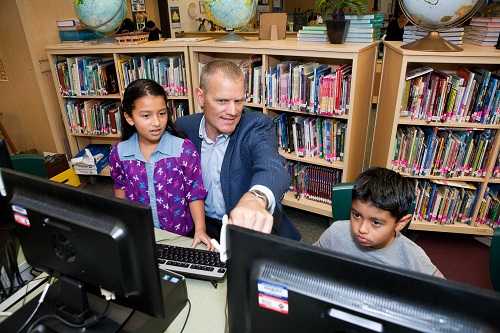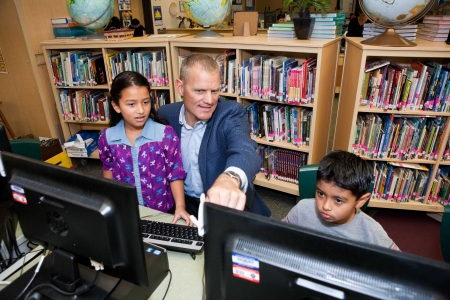Superintendent Steven Webb’s successful one-to-one rollout could serve as a roadmap for districts
Dr. Steven Webb’s rise as a visionary leader in K-12 education is as much a credit to his listening skills as it is to his leadership skills. Before the board of Vancouver Public Schools adopted the strategic plan for the district’s digital transformation in 2008, they did extensive public outreach to ensure that every community in the district had an opportunity to be heard. “What’s happening at our district isn’t my vision,” remarks Webb. “It isn’t the board’s vision. It’s the community’s vision for their children.”
It makes sense. If your district’s digital transformation supports a scalable personalized learning initiative, how personalized can it be if it’s a top-down, one-size-fits-all plan that doesn’t take into account the specific needs of the community?
The district collected more than 2,000 separate sets of input from a variety of different engagement strategies, including focus groups with targeted audiences, such as parents and students in unique populations they might not have heard from otherwise.
The district did deliberate outreach to low-income and Russian- and Spanish-speaking communities that might not reply to an online survey pushed out to the entire district. They even reached out to local patrons and businesses, community thought leaders, and higher-ed partners. “At the end of this very extensive process, we had a clear and compelling vision for this digital transformation, and community ownership of this vision,” explains Webb.
Next page: How to scale one-to-one
The key priority that came out of the strategic planning process was labeled Time and Space. Technology—specifically mobile devices—played a big part in the vision. “For us, it’s about thinking differently about how we leverage and think creatively about how we use time, space, and technology to maximize learning potential and to scale personalized learning with fidelity,” explains Webb. “It’s about finding the best ways to scale mass customization.”
Currently, the district is in its third year of scaling its mobile learning initiative. Eleven of the district’s 35 sites are completely one-to-one. As an entry point, the district started with several schools of choice—magnet schools and a clutch of middle schools. It’s now scaled up to its remaining middle schools and is seeding pilots at one of its 6-12 schools. Next year the initiative will expand to the district’s comprehensive high schools and the following year to one of its elementary schools in grade five. Finally, they’ll expand to grades four and three together in all elementary schools. It’s a methodical roll-out designed to ensure that the implementation matches the needs of each student population, with each stage being seeded in a beta environment a year ahead of its full implementation.
Webb stresses that their approach to their digital transformation isn’t about the technology, it’s fundamentally about transforming the kinds of learning experiences that students have in their classrooms, uniformly. “We deliberately scaled this in a way that focuses on a whole systems approaches to organizational change,” explains Webb. “In order to get that second-order transformational change, we’re making sure that this is connected to student learning outcomes and instructional quality, and that we have a robust professional development ecosystem in place that supports collegial ongoing job-embedded support in order to equip our teachers with the knowledge, skills, habits, and dispositions to leverage these digital learning resources in transformative ways.”
The district began with instructional quality, and then linked it to an instructional framework, which it supports through high-quality professional development. From there, it began scaling the other elements—curating content for teachers, rolling out content and learning management systems. “If you start by just handing out iPads, or laptops, or digital textbooks, the initiative might work in the short term, but you won’t be able to scale up to get at mass customization,” Webb says.
The district will scale close to 18k devices in grades 3-12 within the next three years; Webb’s predecessor had the forethought to install a large pipeline at the district so having the bandwidth to support that number of devices is not an issue.
Next page: Keeping learning central to the program
When the district scales to a school, they deploy an instructional technology facilitator who works in collaboration with the school to help staff think differently about instructional quality and digital media. “Their job isn’t about fixing the technology,” explains Webb. “We’ve got the hardware team and a network team that’s responsible for that. Their job is about getting out high-quality instructional transformation and learning outcomes.” All of these elements were part of the levy request that passed in 2013 and are embedded in that strategic vision developed in 2008. “So everybody had a sense of the vision, that this is a whole system that needs to be in place in order to deliver on this notion of mass customization,” explains Webb.
What excites Webb the most about the way in which the district approached its digital transformation is that the initiative has always started and ended with student learning and setting students up for success. “It’s about the building knowledge, skills, and habits for our young people to be able to thrive in a global interdependent economy, and to be future-ready, successful graduates of our school system.”
In the years since adopting the initiative, Webb has been involved in taking his mass customization model and scaling it beyond the boundaries of his district. The district is an active member of Digital Promise’s League of Innovative Schools and is hosting the League’s spring meeting. Also, the district was chosen as one of 12 host sites for the White House and the Department of Education’s ConnectEd to the Future conference.
“This is fundamentally about leveraging learning across like-minded schools in the nation who want to transform outcomes for kids, close achievement gaps, and accelerate student achievement through the use of digital learning resources that can personalize learning in a way that enables that to happen,” explains Webb. “Being a part of a professional learning network isn’t just about receiving help and ideas and insights, it’s also about contributing.“
Webb spends a considerable amount of time his district’s schools and classrooms, and so he can see first-hand that student engagement is off the charts. As Webb explains, if students are engaged in their learning, they’re more likely to demonstrate mastery of standards. And if they’re more likely to get at the learning target in a specific lesson, they’re more likely to demonstrate competencies on standardized assessments and to develop the capacities that enable them to be future-ready. “These 21st century skills that our students are building are not just about core standards,” explains Webb. “It’s communication, collaboration, creativity, critical thinking, and citizenship.”
Jennifer Welch is a freelance writer based in Brooklyn, N.Y.
This article is part of eSchool News‘ Profiles in Vision series, exploring visionary leaders transforming their communities through technology. Previously, we profiled Superintendent Darryl Adams. Suggest future profile candidates to the editor.
- TC- What student choice and agency actually looks like - November 15, 2016
- What student choice and agency actually looks like - November 14, 2016
- App of the Week: Science sensor meets your smartphone - November 14, 2016



